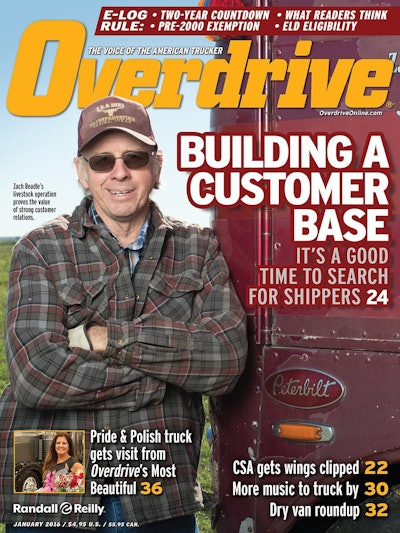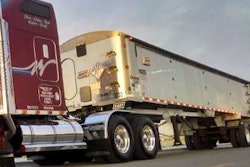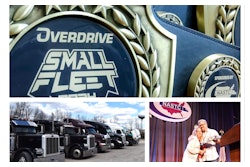Ron Hazel is traffic manager for GEA, Inc., a manufacturer of milking products and other freight, typically moved in dry vans, that wrote in following release of this month’s cover story on building relationships with shippers for long-term success.
 Follow this link to access the feature package here at OverdriveOnline.com.
Follow this link to access the feature package here at OverdriveOnline.com.Hazel’s query was directly related to how exactly to find owner-operators willing to serve his freight needs. Turns out, he prefers dealing with the businessman in the cab to several experiences he’s had getting burned by large asset-based carriers over-promising on service only to turn around and not deliver, putting him in a bind.
Dealing directly with owner-operators without a broker middleman, too, leads to better rates for both his operation and the owner-operator’s, he believes. Better service, too.
To give you an idea on volume, he says, “we had 7,000 LTL shipments last year, and 2,900 truckloads. GEA is a German company in the food-processing business.”
When he went to work there in 1998 after a long career in transportation in a variety of roles, the company was called Babson Brothers, makers of the Surge Milker. “I used their equipment as a kid growing up,” he says, “and again at the University of Kentucky. A year after I went to work here, Westphalia bought the company, now owned by GEA – now they’re promoting GEA as all the companies. They make all kinds of refrigeration and storage equipment,” brewery equipment and more.

In terms of the mostly small carriers he works with today, including some independent owner-operators, he says he’s “probably got more capacity right now than I’ve had in the 18 years I’ve been here.”
How’s he made his trucking contacts to date? “Over the years, I’ve had different ways to contact companies, from flyers at truck stops to occasional use of a freight broker. “If the driver shows up and clearly knows what he’s doing, is presentable, I’ll give him a handout to take to their company owner.”
From his base facility in Naperville, Ill., just west of Chicago, Hazel says, the company in particular “sends a lot of stuff up to South Dakota, Iowa, and Minnesota and surrounding states,” rural areas where the dairy cows are.
Operators domiciled in those areas, and others where the company commonly ships, he’s always particularly interested in working with — a possible to way to put together a solid back-and-forth lane with his loads on the return. (GEA itself also has some flatbed freight originating in Wisconsin and New York State.)
Service needs are the paramount concern, he says, making an old transport analogy to a horse’s superior speed coming back to the barn versus the outbound trip: “If you can get a guy coming back to where he lives, you’re going to get good service.” And rates, he says, but don’t sell yourself short just to get home, as it were.
At once, the company also has freight that runs in 250-gal. totes that are round-trip possible, loaded both ways as far west as Colorado and back.
“Anytime I can sign a person that’s interested in doing some work for us, I take the time to talk to him,” Hazel says, encouraging anyone with future interest to contact him directly: 630-548-8321 or [email protected].
“I get brokers that call me all the time,” Hazel says. “If I’ve got time to talk to them, I’ll get into a conversation.”
He always is quick to ask, “Where do you buy groceries?”
The invariable answer — the grocery store — then prompts questions of why the broker doesn’t use a delivery service like Peapod. “They buy their groceries at the grocery store because the groceries are there,” Hazel says.
Personally, he adds, “I don’t want somebody else buying my groceries, and ‘I don’t want you buying my transportation.’ If I’m spending a dollar for transportation I want to get a dollar’s value out of it, and If I’ve got to pay a higher price, I’d much rather” that money go to the man doing hauling.
With the continuing rise of automated brokerage and the so-called “Uberization” of trucking, Hazel has dipped his toes into services like Go By Truck, one he says he tried and which was “not bad” for filling a last-minute need. But “I plan a lot of my loads three-four days out – positioning a driver to come home rather than waiting for the last minute.”
When we talked Monday, “I’m starting on working on loads to pick up a load on Friday,” he said. “I’d rather the carrier directly tell me they can’t do it than have a broker say, well, I reckon we could raise the price to find somebody else.”
In the end, Hazel believes the principle reason some owner-operators “are struggling is they’re surrendering their profit to the broker.”
For better margins, and long-term health, doing the hard work on relationship building with direct shippers will pay off in the long term. There are plenty more folks out there just like Hazel, no doubt.













